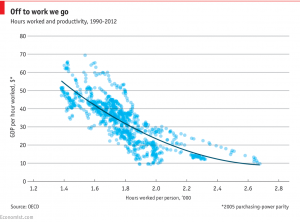Nowadays, more and more people are working long hours and taking less and less vacations. According to this article, employees in the United States only use 51% of their eligible paid vacation time, and for Chinese the number is even lower. If you calculate the number, that’s nearly 50 billion dollars left unused annually by workers in the states. But does longer working hour reflect a greater amount of work done? The answer might be “no”.
Working hour and productivity
Longer working hours leads to a fall in labour output per hour, as indicated by the graph below.
There has been a lot of paper published on the topic, demonstrating that reduced working hour may higher productivity. This more recent paper shows that working longer hour doesn’t mean quality work. In fact, it is probably the opposite. It all comes down to how people work smart instead of work long hours.
Unlimited Vacation Policy
There is an increasing tendency for companies to offer unlimited vacation as compensations or a way to encourage workers to recharge. Companies that offer unlimited policy includes Netflix, Evernote, Chegg, Prezi and other technology-based firms at Silicon Valley. LinkedIn is the latest to join the group. According to the Society for Human Resource Management survey, even though only 2% of employers on the market offer such benefit, it’s evident that other industries are following the trend.
Having an unlimited vacation policy might sound attractive at first glance but does it really benefit the employees? It’s undeniable that there are a lot of benefits:
- Trust and flexibility: Having an unlimited vacation policy implies company’s trust on their employees and it provides high flexibility for employees’ work-life balance.
- Higher Productivity: Research shows that working over 40 hours per week without vacation leads to reduced productivity; Being able to relaxed and off-work for a longer period of time might bring higher productivity.
- Selling point for recruitment: Such policy will make the company more appealing in the job market and attract like-minded candidates.
However, that’s not the whole story. Employees whose income relies heavily on commissions may not take advantage of the policy, makes it redundant. In fact, this has happened in real life. Majority of the employees won’t go on vacations as much as employers anticipated. In addition, an unlimited vacation policy is not “unlimited” in the sense that workers still need to request from his/her boss for a leave. If the worker hasn’t done the work, there is high probability that the policy doesn’t apply to him/her.
It’s also important to keep in mind that corporation, good ones and bad ones, all share a same common goal — get the most out of the employers given the salaries they pay. To achieve a work-life balance, it is truly up to workers to choose between working long hours or more time with family, friends or one’s self. Most importantly, workers should start by working smart and improving efficiency/productivity for a better balanced life.
Here’s a TED talk that elaborate on how to achieve a better work-life balance.
Credit to: Ted Talk x PSU
Luxi Xu
Comments:
Katherine’s Effects of Sleep Deprivation
Sainan’s Can we predict the future
Esther lo’s Embalming Rosalia Lombardo



